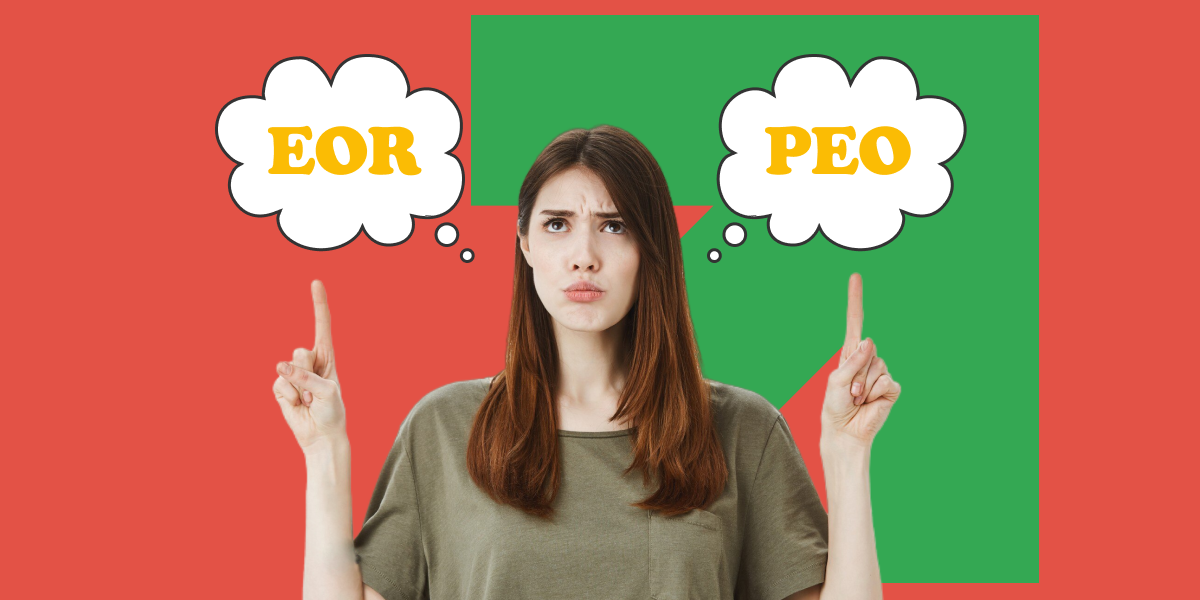Growing a business, whether at home or abroad, can be a real headache. Two popular helpers for this are Employer of Record (EOR) and Professional Employer Organization (PEO). They might sound similar, but they serve distinct purposes and have different levels of responsibility. Let’s walk through this.
Understanding the Core Differences
Employer of Record (EOR)
An EOR acts as the official employer for your remote workforce, handling all employment-related responsibilities.
They take over all the HR paperwork when you hire or manage remote employees in another country. EOR handles things like paying your team, managing taxes, providing benefits, and making sure your business and employees are compliant with local laws, and protecting you from any potential problem.
You’ll still have 100% control over your remote team. The EOR is here to help you with your global HR needs so you can concentrate on your work and your employees without the need to set up a whole new company overseas.
Professional Employer Organization (PEO)
A PEO establishes a co-employment relationship with your company.
You will get to keep control over your team because you remain the legal employer of the people you hire. That means you’re still responsible for your team and any problems that might come up.
The role of the PEO is to help you with the paperwork stuff like payroll, benefits, and making sure everything follows the rules— similar to what an EOR provides. It’s like having an extra set of hands to handle the HR stuff so you can focus on growing your business.
The difference is that you will need to have an established entity in the country where you wish to partner with a PEO.
Key Considerations for Choosing Between EOR and PEO
- Geographic Scope:
EOR: Ideal for global expansion. EORs have established entities in multiple countries, making it super easy to hire and manage remote employees around the world.
PEO: Mainly focused on domestic operations within a specific country.
- Legal and Compliance Responsibility:
EOR: Takes complete ownership of employee-related legal matters. EOR handles all labor laws and tax responsibilities for your team.
PEO: Both the client company and PEO share responsibility for legal matters, and require a deeper understanding of employment laws and regulations.
- Level of Control:
EOR: Gives you 100% control over business operations and employee management. Only takes control over day-to-day HR functions like processing payroll, taxes, benefits, and compliance.
PEO: Allows you to retain total oversight of your tasks and team while the PEO takes responsibility for everyday HR tasks including payroll, taxes, and benefits administration.
- Scalability:
EOR: Perfect for quickly growing your business worldwide. EOR services can easily allow you to hire or manage new staff in multiple countries.
PEO: Great for growing your business at home, but may have limitations when expanding internationally.
The decision between EOR and PEO depends on your specific business needs and goals.
Choose EOR if:
- You want to expand into a new market quickly without having to set up a legal entity.
- You need help with HR tasks and full compliance with local labor regulations.
- You need help with risk mitigation and want to focus on core business operations.
- You want to improve your existing HR functions and benefits offerings.
Choose PEO if:
- You already have a legal entity in the target country.
- You have a well-established HR department but need additional support.
- You want to improve your existing HR functions and benefits offerings.
- You want to share employment responsibilities with a partner.
If your company doesn’t have an entity in the country where you want to employ someone, an Employer of Record (EOR) is the right choice. A PEO can help you employ in other countries, but you need to have a business set up there first.
If your business is focused solely on domestic operations, a PEO can help manage your HR needs. But, if you have plans to expand your business globally and want expert help with HR, payroll, and legal compliance in those new markets, an EOR like Filta is a great solution.
You can visit https://filtaglobal.com/services/ to explore our Employer of Record solutions.
Ultimately, both EORs and PEOs can be really helpful for companies managing remote employees in different places. They each offer unique advantages. Take the time to think about your specific needs and goals, to pick the best one for your business.





